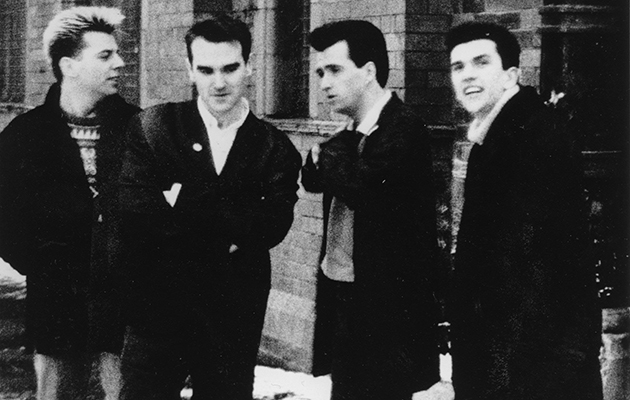This is not the first Smiths compilation, but unlike previous efforts, it comes with the blessing of the group. Morrissey, it seems, supplied the title (not – it must be said – one of his more inspired efforts), while Johnny Marr supervised the mastering, ensuring that it is aurally brighter than the WEA Singles album, and sounds oddly contemporary for music that is up to a quarter-century old.
Most of it is familiar, and, surprisingly, most of it is timeless. Surprisingly, because at the time of its first release, Morrissey’s moaning seemed precisely-tuned to the ill winds of Thatcherism, industrial decline, and student angst – a mordant corrective to the high tides of new romanticism, Club Tropicana and all that.
But Morrissey was a classicist, and old for his years, taking his imagery from kitchen sink dramas while others fooled around with the politics of pleasure. He was living in a black-and-white world; listening to his words now, what’s most striking is just how unlikely they are in a rock’n’roll context. Morrissey minted his own clichés, employing the wisdom of grandmothers. The lyrics are beyond John Braine, and into a deeper strain of English melancholy, somewhere between the sentimentality of John Betjeman and the deferred pleasure of Philip Larkin. There’s a bit of Kenneth Williams (the bit in Carry On Cleo, with Williams’ camp Caesar falling on the sword of his favourite gladiator, shouting “Infamy! Infamy! They’ve all got it infamy!”).
Interestingly, it still sounds brilliant. And if nothing can quite replicate the excitement of hearing these songs for the first time, the first disc of this double-CD set makes a good job of restating the importance of The Smiths as a singles band. It moves chronologically, from the extraordinary first two Rough Trade singles, “Hand In Glove” and “This Charming Man”, through “How Soon Is Now” And “Panic”, and closes with “Last Night I Dreamt That Somebody Loved Me” – adding the odd album track, European release, or projected single release, along the way.
From the start – the deceptively bluesy fade-in of “Hand In Glove” – Morrissey pitches his vocal on the nursery slopes of hysteria, so birthing an entirely singular pop persona. It’s hard to say who he sounds like. There’s a bit of Johnnie Ray (hence the hearing aid), but equally he could be a shower stall crooner at the public baths. He is both coy and boastful, and despite all his protestations of abstinence and incompetence, avowedly homoerotic. The sun, remember, shines out of his behind. It is an odd pitch for a rock singer to make, particularly one so enamoured with the New York Dolls. (Morrissey’s other youthful passion, for James Dean, may have had more impact on the way he presented himself as a lonely, repressed pin-up.)
It’s true to say that The Smiths built on ground prepared by Edwyn Collins in Orange Juice, who interpreted the rules of punk in a way which gave them to be arch and fey and gentle rather than artificially angry (see “Blue Boy” or “Lovesick”); and the Buzzcocks, who were expert at romantic detachment. (You can feel the warning tremors in Howard Devoto’s “Boredom”.) But Morrissey delivered a complete package. He was the outsiders’ outsider. And no one would have heard of him, if it wasn’t for Johnny Marr.
It’s a matter of chemistry. The Smiths work as a group because Marr’s music was as bright as Morrissey’s words were black. The singer brought clouds, Marr was the breeze. And he doesn’t sound much like his influences either. You’d listen to the Smiths for a long time before you detected Lieber and Stoller or the Shangri-La’s, and critics who sensed the Byrds in Marr’s jangling guitar were imagining things. There are some psychedelic flourishes, but listen to “Ask” and what you hear is the jittery positivity of African pop.
More conventionally, it’s just about possible to perceive echoes in Marr’s playing of the decorative shading James Honeyman-Scott brought to The Pretenders, even if Chrissie Hynde and Morrissey would make implausible bedfellows. Marr’s tunes make Morrissey’s peculiarities pretty, but they are complimentary in one important respect: Marr is a colourist, not a glory-hunter, and Morrissey’s posturing is all about self-deprecation, if not self-abuse, which is why the Smiths remain the antidote to cock rock.
There is a second disc, of B-sides, and it’s less vital. The lovely moments – “Please Please Let Me Get What I Want”, “Wonderful Woman” – collide with throwaway items which should have been thrown away. In particular, the “New York” version of “This Charming Man” – with “Motown” interlude and 1980s’ drums – illustrates just how fragile the ecology of the Smiths was.
ALASTAIR McKAY



